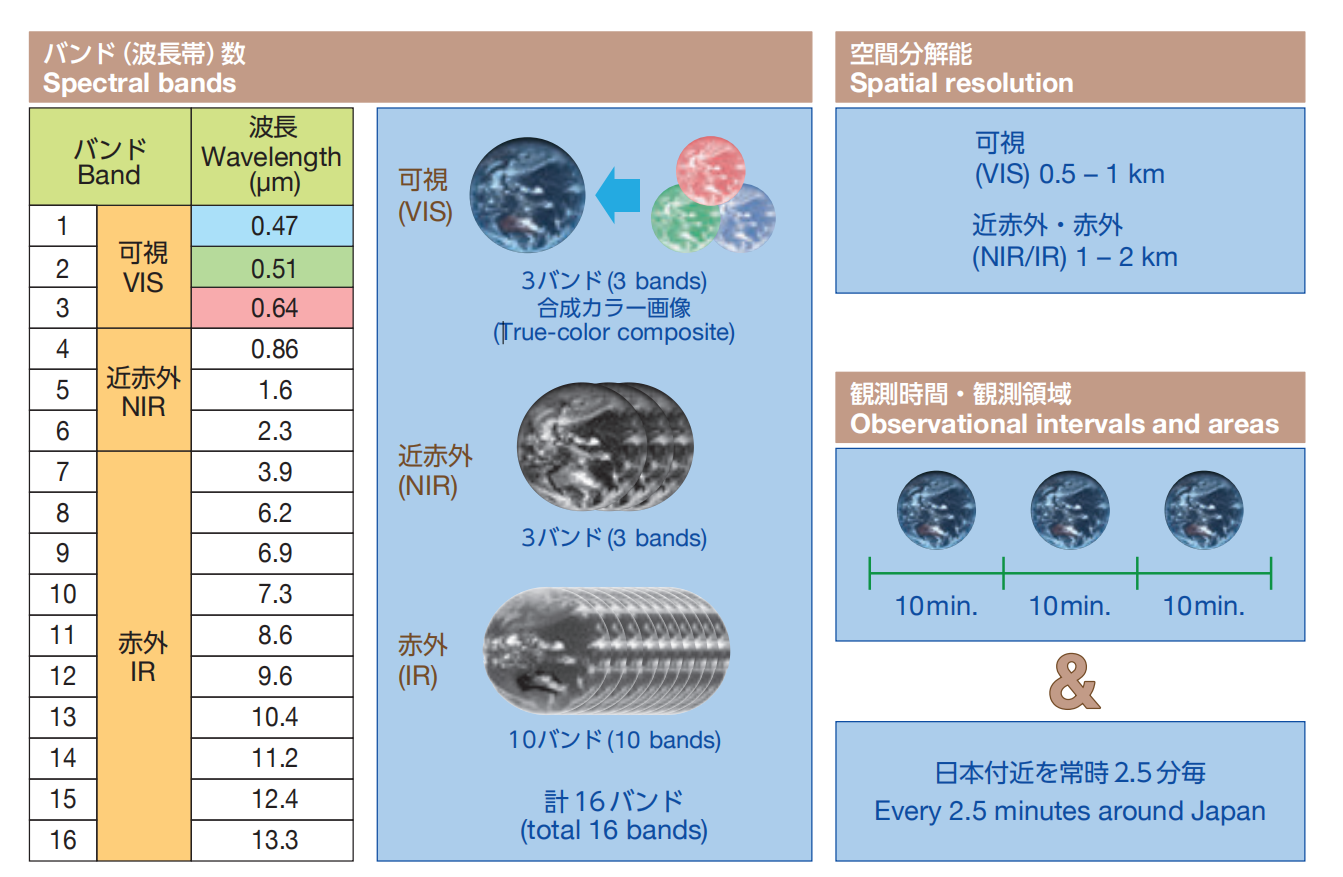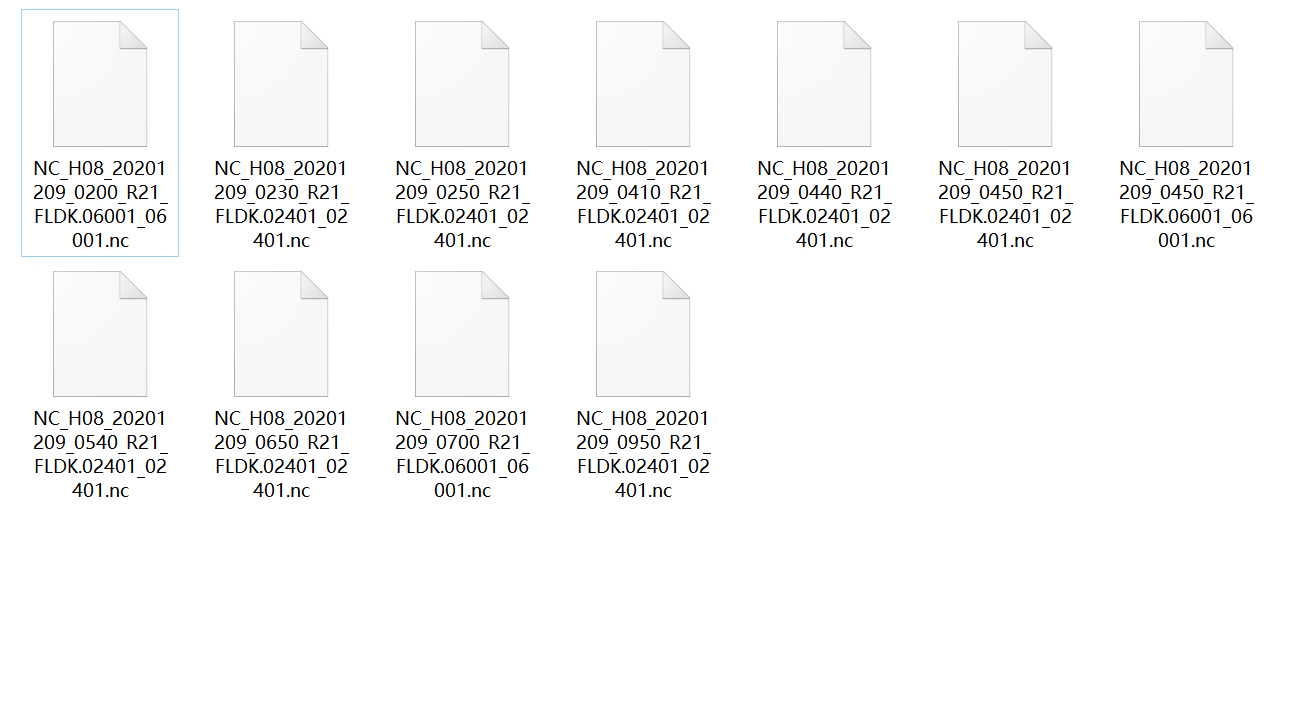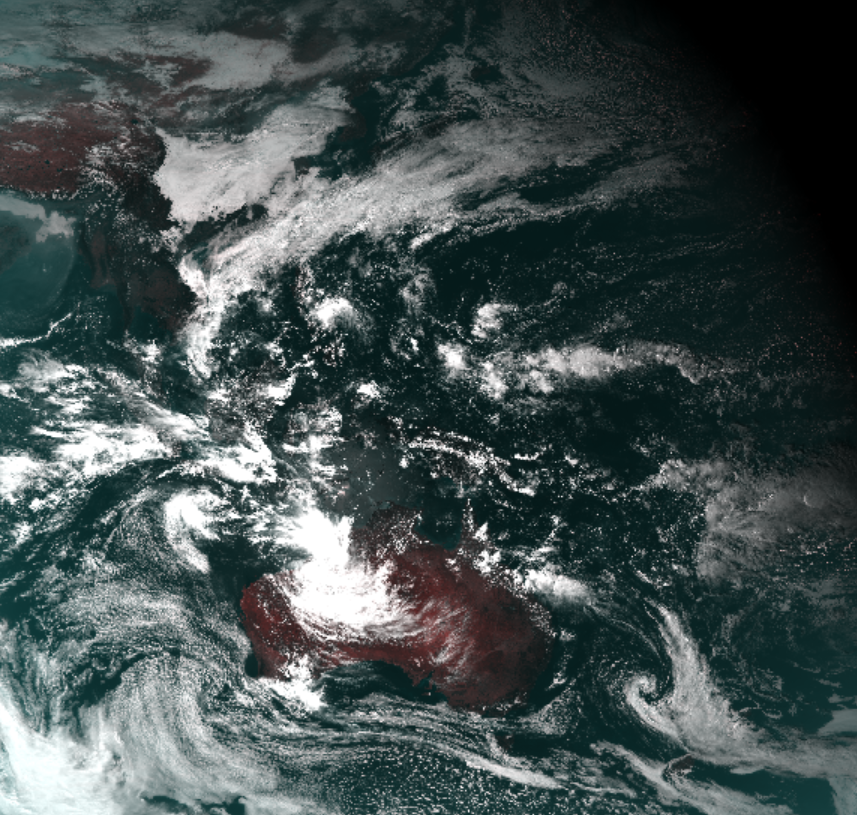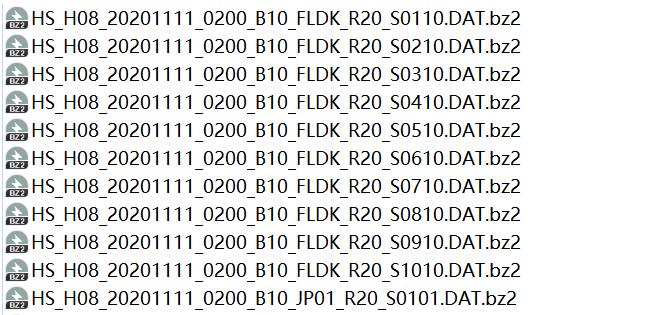Himawari 8数据介绍及下载转换
Himawari 8数据介绍及下载转换
1.Himawari-8卫星简介
日本发射的静止轨道卫星。JMA于2015年7月7日开始运营Himawari-8, Himawari-9号卫星于2017年3月10日开始后备运行。两颗卫星都位于向东约140.7度的轨道上,并将观测东亚和西太平洋区域15年。
2. 卫星特性介绍
重访周期短(10min),光谱分辨率高,主传感器为AHI,常用于气象观测。

3. 卫星数据格式介绍
这里仅讨论L1级数据。FTP上分享的数据有.nc、.dat(HSD)两种格式。
1. nc
# Available Himawari L1 Gridded Data
## Full-disk
Projection: EQR
Observation area: 60S-60N, 80E-160W
Temporal resolution: 10-minutes
Spatial resolution: 5km (Pixel number: 2401, Line number: 2401)
2km (Pixel number: 6001, Line number: 6001)
Data: albedo(reflectance*cos(SOZ) of band01~band06)
Brightness temperature of band07~band16
satellite zenith angle, satellite azimuth angle,
solar zenith angle, solar azimuth angle, observation hours (UT)
## Japan Area
Projection: EQR
Observation area: 23N-50N, 123E-150E
Temporal resolution: 10-minutes
Spatial resolution: 1km (Pixel number: 2701, Line number: 2601)
Data: albedo(reflectance*cos(SOZ) of band01~band06)
Brightness temperature of band07, 14, 15
satellite zenith angle, satellite azimuth angle,
solar zenith angle, solar azimuth angle, observation hours (UT)
主要分为两个区域的数据,全圆盘、日本地区。这里仅讨论全圆盘区域,影像空间分辨率一般为5km(2401行/列)/2km(6001行/列),该数据集包含的数据主要有:albedo(反射率 band1-6)、bt(亮温 band 7-16)、太阳高度角/方位角、卫星高度角/方位角(可用于大气校正)、lon、lat...
## Full-disk
NC_H08_YYYYMDD_hhmm_Rbb_FLDK.xxxxx_yyyyy.nc
where YYYY: 4-digit year of observation start time (timeline);
MM: 2-digit month of timeline;
DD: 2-digit day of timeline;
hh: 2-digit hour of timeline;
mm: 2-gidit minutes of timeline;
bb: 2-digit band number (varies from "01" to "16");
xxxxx: pixel number; ("2401": 5km resolution,
"6001": 2km resolution, )
yyyyy: line number; ("2401": 5km resolution,
"6001": 2km resolution, )
Example:
NC_H08_20160831_0000_R21_FLDK.02401_02401.nc
NC_H08_20160831_0000_R21_FLDK.06001_06001.nc
## Japan Area
NC_H08_YYYYMMDD_hhmm_rbb_FLDK.xxxxx_yyyyy.nc
where YYYY: 4-digit year of observation start time (timeline);
MM: 2-digit month of timeline;
DD: 2-digit day of timeline;
hh: 2-digit hour of timeline;
mm: 2-gidit minutes of timeline;
bb: 2-digit band number (fixed to "14");
xxxxx: pixel number; (fixed to "2701" : 1km resolution)
yyyyy: line number; (fixed to "2601" : 1km resolution)
Example:
NC_H08_20160831_0000_r14_FLDK.02701_02601.nc
以上是全圆盘数据的命名格式,其中NC_H08_YYYYMDD_hhmm_Rbb_FLDK.xxxxx_yyyyy.nc注意R代表全球,而r代表日本,后面两位代表分辨率。文件内的时间为UTC时间,跟北京时间相差8小时,简单说UTC时间 = 北京时间 - 8小时
2. hsd
# Available Himawari Standard Data
## Full-disk
Observation area: Full-disk
Temporal resolution: 10-minutes
Spatial resolution: 0.5km (band 3), 1km (band 1,2,4), 2km (band 5-16)
## Japan Area
Observation area: Japan area (Region 1 & 2)
Temporal resolution: 2.5-minutes
Spatial resolution: 0.5km (band 3), 1km (band 1,2,4), 2km (band 5-16)
## Target Area
Observation area: Target area (Region 3)
Temporal resolution: 2.5-minutes
Spatial resolution: 0.5km (band 3), 1km (band 1,2,4), 2km (band 5-16)
## Color Image Data
png images of Full-disk, Japan area and Target area, compositing three visible
bands (blue: 0.47 micron; green: 0.51 micron; red: 0.64 micron).
数据结构暂时不详,这里只看分辨率。分辨率全面优于nc,0.5km (band 3), 1km (band 1,2,4), 2km (band 5-16),最高达到了500m。提供的数据有全球、日本、目标区的影像及真彩图。
where YYYY: 4-digit year of observation start time (timeline);
MM: 2-digit month of timeline;
DD: 2-digit day of timeline;
hh: 2-digit hour of timeline;
mm: 2-gidit minutes of timeline;
bb: 2-digit band number (varies from "01" to "16");
jj: spatial resolution ("05": 0.5km, "10": 1.0km, "20": 2.0km);
kk: segment number (varies from "01" to "10"); and
ll: total number of segments (fixed to "10").
example: HS_H08_20150728_2200_B01_FLDK_R10_S0110.DAT
在ftp中的存储形式是一个波段一个dat文件。

4. 数据的自动下载及转换
主要参考以下几篇文章:https://blog.csdn.net/esa_dsq/article/details/105109487 、
https://blog.csdn.net/qq_44317919/article/details/108245097?ops_request_misc=%257B%2522request%255Fid%2522%253A%2522160566320519724836713938%2522%252C%2522scm%2522%253A%252220140713.130102334.pc%255Fall.%2522%257D&request_id=160566320519724836713938&biz_id=0&utm_medium=distribute.pc_search_result.none-task-blog-2allfirst_rank_v2~rank_v28_p-4-108245097.pc_first_rank_v2_rank_v28p&utm_term=himawari-8%E6%95%B0%E6%8D%AE%E8%87%AA%E5%8A%A8&spm=1018.2118.3001.4449
原文是选择下载L3级AOD数据,这里笔者改成了下载L1级nc数据,数据下载到本地后入库并转换成tif,分别存入albedo/tbb两个子文件夹中。
Now, show u the main code.
-
核心模块:下载ftp数据
class myFTP: ftp = ftplib.FTP() def __init__(self, host, port=21): ''' @desc:连接FTP,host是IP地址,port是端口,默认21 ''' self.ftp.connect(host, port) def Login(self, user, password): ''' @desc:登录FTP连接,user是用户名,password是密码 ''' self.ftp.login(user, password) print(self.ftp.welcome) # 显示登录信息 def DownLoadFile(self, LocalFile, RemoteFile): ''' @desc:下载单个文件,LocalFile表示本地存储路径和文件名,RemoteFile是FTP路径和文件名 ''' bufSize = 102400 file_handler = open(LocalFile, 'wb') print(file_handler) # 接收服务器上文件并写入本地文件 self.ftp.retrbinary('RETR ' + RemoteFile, file_handler.write, bufSize) self.ftp.set_debuglevel(0) file_handler.close() return True def DownLoadFileTree(self, LocalDir, tifDir, RemoteDir, choice, dateStr): ''' @desc:下载整个目录下的文件,LocalDir表示本地存储路径, RemoteDir表示FTP路径 ''' # print("remoteDir:", RemoteDir) # 如果本地不存在该路径,则创建 if not os.path.exists(LocalDir): os.makedirs(LocalDir) # 获取FTP路径下的全部文件名,以列表存储 # 好像是乱序 self.ftp.cwd(RemoteDir) # 设置FTP当前操作的路径 RemoteNames = self.ftp.nlst() # 获取目录下的文件 RemoteNames.reverse() # print("RemoteNames:", RemoteNames) for file in RemoteNames: # 先下载为临时文件Local,下载完成后再改名为nc4格式的文件 # 这是为了防止上一次下载中断后,最后一个下载的文件未下载完整,而再开始下载时,程序会识别为已经下载完成 Local = os.path.join(LocalDir, file[0:-3] + ".temp") LocalNew = os.path.join(LocalDir, file) ''' 下载小时文件,只下载UTC时间1时至9时(北京时间9时至17时)的文件 下载的文件必须是nc格式 若已经存在,则跳过下载 ''' # 小时数据命名格式示例:NC_H08_20201210_1300_R21_FLDK.06001_06001.nc # R代表全球区域,分辨率分为5KM/2KM两种图像 if choice == 1: if int(file[16:18]) >= 1 and int(file[16:18]) <= 9 and file[21]=='R': if not os.path.exists(LocalNew): print("Downloading the file of %s" % file) self.DownLoadFile(Local, file) os.rename(Local, LocalNew) print("The download of the file of %s has finished\n" % file) albedoPath, tbbPath = nc2tiff(LocalNew, tifDir) insert2database(file, LocalNew, albedoPath, tbbPath, dateStr) elif os.path.exists(LocalNew): print("The file of %s has already existed!\n" % file) else: pass self.ftp.cwd("..") # 设置FTP当前操作的路径 return def close(self): self.ftp.quit() 该代码块是从上述链接中迁移而来,并且做了一定的修改。这里的难点只要在ftp命令的掌握和影像命名格式的熟悉,下面给出一些常用的ftp命令。
from ftplib import FTP #加载ftp模块 #ftp登陆连接 ftp=FTP() #设置变量 ftp.set_debuglevel(2) #打开调试级别2,显示详细信息 ftp.connect("IP","port") #连接的ftp sever和端口 ftp.login("user","password") #连接的用户名,密码 ftp.getwelcome() #欢迎信息 ftp.cmd("xxx/xxx") #进入远程目录 bufsize=1024 #设置的缓冲区大小 filename="filename.txt" #需要下载的文件 file_handle=open(filename,"wb").write #以写模式在本地打开文件 ftp.retrbinaly("RETR filename.txt",file_handle,bufsize) #接收服务器上文件并写入本地文件 ftp.set_debuglevel(0) #关闭调试模式 ftp.quit() #退出ftp #ftp相关命令操作 ftp.cwd(pathname) #设置FTP当前操作的路径 ftp.dir() #显示目录下所有目录信息 ftp.nlst() #获取目录下的文件 ftp.mkd(pathname) #新建远程目录 ftp.pwd() #返回当前所在位置 ftp.rmd(dirname) #删除远程目录 ftp.delete(filename) #删除远程文件 ftp.rename(fromname, toname) #将fromname修改名称为toname。 ftp.storbinaly("STOR filename.txt",file_handel,bufsize) #上传目标文件 ftp.retrbinary("RETR filename.txt",file_handel,bufsize) #下载FTP文件常用的上传及下载文件。
# !/usr/bin/python # -*- coding: utf-8 -*- from ftplib import FTP def ftpconnect(host, username, password): ftp = FTP() # ftp.set_debuglevel(2) ftp.connect(host, 21) ftp.login(username, password) return ftp #从ftp下载文件 def downloadfile(ftp, remotepath, localpath): bufsize = 1024 fp = open(localpath, 'wb') ftp.retrbinary('RETR ' + remotepath, fp.write, bufsize) ftp.set_debuglevel(0) fp.close() #从本地上传文件到ftp def uploadfile(ftp, remotepath, localpath): bufsize = 1024 fp = open(localpath, 'rb') ftp.storbinary('STOR ' + remotepath, fp, bufsize) ftp.set_debuglevel(0) fp.close() -
数据入库(mysql)
def insert2database(ftpPath, filePath, albedoPath, tbbPath, dateTime): ''' @description:数据入库png ''' #输入数据库的字段值 png_uuid = str(uuid.uuid1()) conn = pymysql.connect( db = 'himawari8', user = 'root', password = 'root', host = 'localhost', port = 3306 ) cur = conn.cursor() #首先查询数据是否存在 #查询影像对应的uuid是否存在 #新建表'downloadHimawari8',存放这些生成的数据 sql = 'SELECT uuid FROM ' + 'downloadHimawari8' + \ ' WHERE ftpPath=%s;' sql_data = (ftpPath) cur.execute(sql, sql_data) sql_res = cur.fetchall() if len(sql_res) == 0: print('正在入库...') sql = 'INSERT INTO ' + 'downloadHimawari8' + \ ' (uuid,ftpPath,filePath,albedoPath,tbbPath,dateTime) VALUES (%s,%s,%s,%s,%s,%s);' sql_data = (png_uuid,ftpPath,filePath,albedoPath,tbbPath,dateTime) # print(sql%sql_data) cur.execute(sql, sql_data) conn.commit() else: print('[warning] 该文件已经存在,即将更新文件!') sql = 'UPDATE ' + 'downloadHimawari8' + \ ' SET uuid=%s,ftpPath=%s,filePath=%s,albedoPath=%s,tbbPath=%s,dateTime=%s;' sql_data = (png_uuid,ftpPath,filePath,albedoPath,tbbPath,dateTime) cur.execute(sql, sql_data) conn.commit() cur.close() conn.close()注意:这里需要安装mysql,参考https://www.cnblogs.com/winton-nfs/p/11524007.html
-
nc转tif
def nc2tiff(ifile, outDir): ''' @desc: 只适用于Himawari-8 全球区域(R)对应的L1影像 读取nc转换成tif,生成同名albedo/tbb文件 @ifile: nc文件路径 @outDir: 输出路径 ''' ds = h5py.File(ifile, mode='r') all_vars = list(ds.keys()) firstData = ds['albedo_01'][:] anotherData = ds['tbb_10'][:] lon = ds['longitude'][:] lat = ds['latitude'][:] count = 0 data1 = np.zeros((firstData.shape[0], firstData.shape[1], 6)) for var in all_vars: if var.startswith(str('albedo_')): data1[:,:,count] = ds[var][:] count = count + 1 count = 0 data2 = np.zeros((anotherData.shape[0], anotherData.shape[1], 10)) for var in all_vars: if var.startswith(str('tbb_')): data2[:,:,count] = ds[var][:] count = count + 1 xCell = (lon.max()-lon.min())/len(lon) yCell = (lat.max()-lat.min())/len(lat) geotrans = (lon.min(), xCell, 0, lat.max(), 0, -yCell) srs = osr.SpatialReference() srs.ImportFromEPSG(4326) proj = srs.ExportToWkt() albedoPath = os.path.join(outDir, 'albedoPath') tbbPath = os.path.join(outDir, 'tbbPath') if not os.path.exists(albedoPath): os.mkdir(albedoPath) if not os.path.exists(tbbPath): os.mkdir(tbbPath) albedoPath = os.path.join(albedoPath, os.path.basename(ifile).replace('.nc', '_albedo.tif')) tbbPath = os.path.join(tbbPath, os.path.basename(ifile).replace('.nc', '_tbb.tif')) raster2tif(data1, None, type(data1), geotrans, proj, albedoPath) raster2tif(data2, None, type(data2), geotrans, proj, tbbPath) return albedoPath, tbbPath在读取albedo/tbb数据集后,需要读取lon/lat矩阵,计算出分辨率及起始点,来确定地理变换(geotrans)。设置好投影和仿射参数后,生成tif。
5. 结果展示



这样我们就生成了对应的tif数据,完成了第一步。
6. 后续
几点问题亟待解决
-
Himawari-8的辐射定标和大气校正
2. **HSD**格式数据的解析





